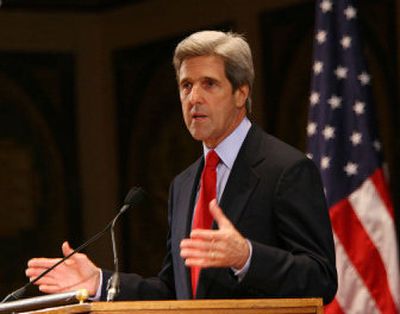Kerry pushes Bush to withdraw troops

WASHINGTON – Sen. John Kerry called Wednesday for President Bush to withdraw 20,000 U.S. troops from Iraq over the Christmas holidays.
Ultimately, Kerry said, as certain benchmarks of progress are attained in coming months, the United States should be able to bring all troops home by the end of next year.
He made it clear that he thinks the U.S. troop presence is inflaming the violence.
“The insurgency will not be defeated unless our troop levels are drawn down,” Kerry, D-Mass., said in a speech at Georgetown University.
“To undermine the insurgency,” he said, “we must instead simultaneously pursue both a political settlement and the withdrawal of American combat forces linked to specific, responsible benchmarks. At the first benchmark, the completion of December elections, we can start the process by reducing our forces by 20,000 troops over the course of the holidays.”
In advocating troop withdrawal, Kerry appears to be trying to bridge a gulf that’s troubling the Democratic Party on what may be the biggest issue looming before national elections in 2006 and 2008. While many of his party’s base supporters passionately oppose the Iraq war, their leaders in Washington haven’t defined a specific strategy for Iraq that differs noticeably from the Bush administration’s.
Indeed, 29 Senate Democrats – including Kerry and other likely 2008 Democratic presidential candidates Hillary Rodham Clinton of New York and Joseph Biden of Delaware, the ranking Democrat on the Foreign Relations Committee – voted for the resolution authorizing force against Iraq.
Like most Democrats in Washington, Clinton and Biden have criticized the administration’s execution of policy in Iraq, but they haven’t called for withdrawal or wavered from their votes to authorize the war.
Kerry, who as the Democrats’ presidential candidate last year refused to commit to an exit plan from Iraq, on Wednesday joined Sen. Russell Feingold, D-Wis., in calling for troop withdrawals. Feingold voted against the war resolution and has argued for a timetable to remove all troops by the end of 2006. He, too, is weighing a bid for the 2008 presidential nomination.
In calling for phased withdrawal, Kerry struck a middle ground between anti-war activists who want an immediate pullout and Bush’s stay-the-course policy.
“We’re seeing the Democrats moving toward that position,” veteran Democratic strategist Bill Carrick said. “Senator Kerry will be joined by others. There’s going to be a consensus around phased withdrawal.”
Kerry’s speech, which had been scheduled for some time, came one day after the U.S. death toll in Iraq reached 2,000.
It also came as polls show public support for Bush at an all-time low and that half of Americans now think the war was a mistake. A slim majority, 55 percent, told a mid-September Gallup poll that it’s time to intensify efforts to withdraw from Iraq, while 41 percent said U.S. policy there shouldn’t change.
During his presidential campaign last year, Kerry struggled to define his Iraq policy and was haunted by his vote for the war resolution.
On Wednesday, he quit defending that vote.
“Knowing now the full measure of the Bush administration’s duplicity and incompetence,” he said, “I doubt there are many members of Congress who would give them the authority they abused so badly. I know I would not.”